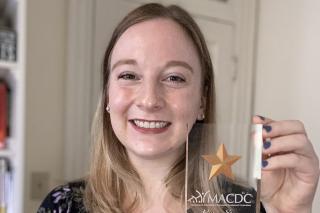Tell us about your position on the board of the Fenway Community Development Corporation (CDC).
I began volunteering with the Fenway CDC as a member of the organizing committee after completing my master's degree in 2017. I joined the board in the spring of 2019 and am now the organizing committee’s board chair. Board members attend monthly meetings, sit on committees, attend CDC events, and most importantly, develop and uphold its strategic vision. The organizing committee that I chair is made up of Fenway residents, and we work together to address issues that impact our community, like advocating for more affordable housing in the neighborhood. We have both long-term and short-term campaigns, which allows us to think about future goals while also addressing current events.
What do you find most rewarding about this position?
The 2016 election was a catalyst for me to get more involved in local politics — presidential elections are incredibly important, but we’re often more impacted and have more power within our own communities. Through my work with the Fenway CDC, I can see our positive impact on the neighborhood:
- We've preserved and redeveloped 97 affordable housing units at New Castle Saranac.
- We campaigned to get the attorney general’s office involved in the no-cause evictions at Our Lady’s Guild House.
- We encouraged community participation in the census and the election.
It's rewarding to feel connected to your community and see that your voice has an impact.
Tell us about receiving the Rising Star Award.
Every year, the Massachusetts Association of Community Development Corporations, the state-wide membership association for CDCs, presents up to three Rising Star Awards to CDC staff or board members who are 40 years old or younger, and who have demonstrated their potential, outstanding innovation, leadership and achievement in community development. It was an honor to receive this award, and I was excited for the Fenway CDC and my colleagues there to receive recognition.
My nomination highlighted the Fenway CDC Racial and Housing Justice Committee (RHJC), which I proposed to the Fenway CDC board and staff this summer. All committee members should definitely share the recognition for this work. Since July, a group of both board and staff members have been meeting to activate sustained conversation on racial equity at Fenway CDC and integrate racial justice goals into our organization. We know of explicitly racist housing policies from the past like redlining. However, racism still impacts access to housing today, often in insidious ways, and we want to make sure our work at the Fenway CDC centers on racial justice.
I intentionally seek out environments that have strong female leaders and institutions that empower women.
How did Simmons help prepare you for what you're doing now?
Simmons played an important role in my educational and professional development. The first public policy class I took was with Professor Ben Cole. It introduced me to a cost/benefit analysis framework when approaching policy — I still use that approach in my work and board service today. It's important to think about the costs and benefits not only in terms of economics, but also the moral and societal impact. We must remember that the status quo has a lot of staying power, but it isn't necessarily the strategic or right way.
Professor Valerie Leiter, my capstone advisor, pushed me academically, but more importantly, helped me believe in myself, realize my potential, and think about what I wanted in a career. She’s actually the reason I have my current job at Jobs for the Future (JFF). As I was wrapping up my master's in public policy, Professor Leiter and I had conversations about my next steps professionally and she connected me to a former student who works at JFF, Lexie Waugh. I had an informational interview with Lexie and was really impressed — I ended up taking a job at JFF a few months later. My work at JFF is focused on reimagining education and workforce systems to make economic advancement possible for all Americans.
Why did you choose to pursue a master's in public policy?
My undergraduate major was sociology of education, and I knew I was interested in addressing inequities in our education system, but I wasn't quite sure how I wanted to pursue that work. I wanted to address some big picture issues in education like inequitable K-12 funding systems, college access and affordability, and education as a means of socio-economic mobility. Studying public policy allowed me to think about how policy could support systemic change and consider the root problems that need to be addressed. When people think about policy, they typically jump right to the federal level, but there's policy at all levels, including local and organizational. Often, the policies that are at the local level actually have more of an impact on our day-to-day lives.
Why did you choose to attend Simmons?
I was working at Simmons full-time and was able to take courses tuition-free as a result, which was amazing! I do love and appreciate women-centered colleges and universities — my undergraduate institution, Bryn Mawr College, was a women-centered college. I intentionally seek out environments that have strong female leaders and institutions that empower women.

